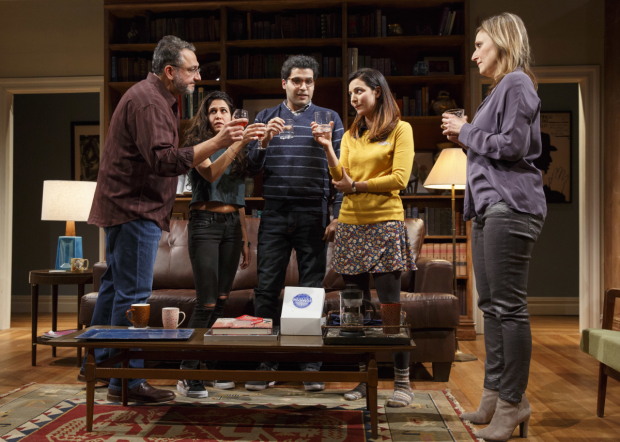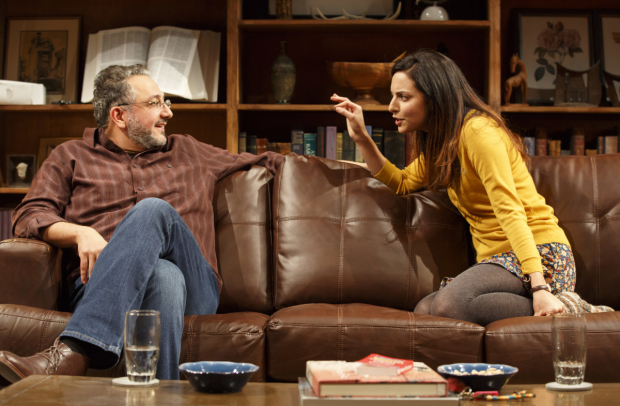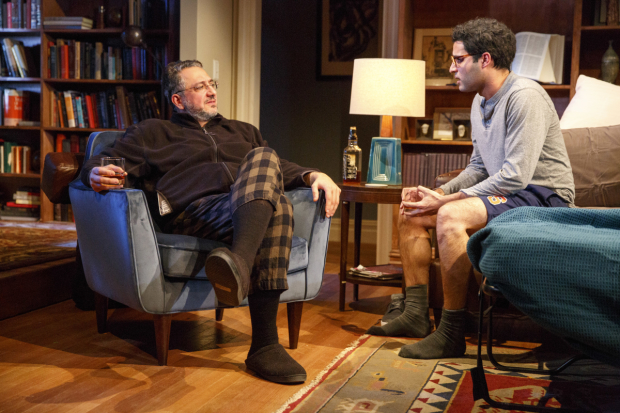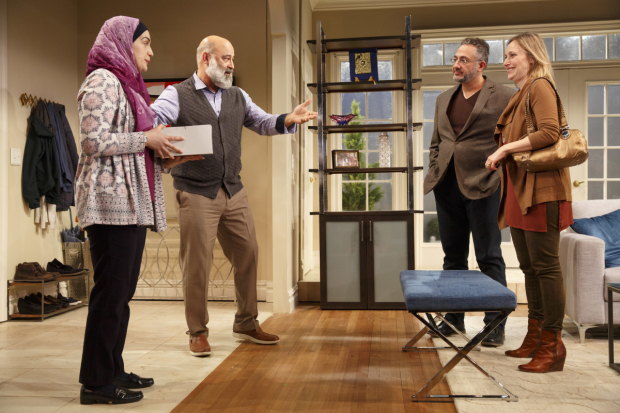
(© Joan Marcus)
You can choose your spouse, but you cannot choose your child's spouse — not in America, not anymore. We see our rejection of arranged marriages as a sign of our commitment to personal liberty and the pursuit of happiness, even if it costs a lifetime of awkward Thanksgivings and Memorial Day barbecues with people we secretly despise. We would much rather she chose someone else, but her happiness (and our liberalism) is worth it, right? Zayd Dohrn astutely captures the disconnect between our ideals and our desires in The Profane, his perceptive and challenging new play at Playwrights Horizons. It tells the story of two young people in love and the families standing apprehensively behind them.
The clash of cultures between two merging families is not a new subject in this country of immigrants: Anne Nichols' 1922 comedy Abie's Irish Rose, about an Irish Catholic girl wedding a young Jewish man, still holds a claim as one of the longest-running plays in Broadway history. The 1967 film Guess Who's Coming to Dinner explored a similar plot with a white woman and black man (memorably played by Sidney Poitier). Perhaps we are drawn to these stories because they reinforce our melting pot mythology: Unlike in the Old World, our Romeos and Juliets can have a happy ending.

(© Joan Marcus)
Dohrn offers a less rosy outlook than those earlier works, but it is one tailor-made for this particularly strident moment in American history, in which shouting from our respective trenches passes for intercultural dialogue: Raif (Ali Reza Farahnakian) is a novelist living in New York City with his wife, Naja (Heather Raffo), and daughter, Aisa (Francis Benhamou). An immigrant from a majority-Muslim country (Dohrn steadfastly neglects to reveal which one) he long ago rejected the strictures of his ancestral tribe, as evidenced by the half-empty bottle of Glenfiddich at his reading table. "I'm an internationalist," he proudly tells his younger daughter, Emina (the sharp and pugnacious Tala Ashe), an independent-minded young woman who isn't convinced that her dad is as open-minded as he claims to be.
Questioning the alleged diversity of Raif's circle of New York City artists and intellectuals, she asks, "Are any of them poor? Uneducated? Do any of them not read The New Yorker, Pa? That's your tribe." Further rebelling against her dad's secular liberal orthodoxy, the increasingly religious Emina has come home for Thanksgiving with the boyfriend of Raif's nightmares in tow: Sam (Babak Tafti) is the son of a conservative Muslim family residing in White Plains. Greeting this unwelcome guest with an arctic chill, Raif cannot help but suspect that Sam's unfailing politeness is meant to hide something. And in that, he turns out to be correct.

(© Joan Marcus)
With the physicality of a cat tiptoeing into unknown territory, Tafti embodies the nervousness of a young man not just encountering a new family, but exploring the possibilities of his adult identity. Born and raised in the U.S., he knows his life will look different than his immigrant dad's, but just how different?
That's not to say his parents live an alien lifestyle: We meet Peter (Ramsey Faragallah) and Carmen (Lanna Joffrey) in their tidy and perfectly bland suburban home during the second act (richly detailed and revealing set design by Takeshi Kata), when they invite Raif and his family to White Plains for a cookout. Nibbling on crudité between matching cream carpets and walls, they don't look very different from every other American upper middle-class family (costume designer Jessica Pabst outfits Peter like a model in the Land's End catalogue). Their religiosity is mostly invisible with the exception of Carmen's hijab and an ornate Koran placed on a high shelf (above the family photos, but below a houseplant). Faragallah plays a jovial host as Peter, who is eager to learn about Raif's writing and his favored baseball team. Joffrey is far more reserved as Carmen, but she is meeting Emina's family for the first time so nerves are understandable. It's hard to understand how anyone could be truly offended by these Pottery Barn Muslims.
But Raif finds a way, assuming the worst of Sam's family in a manner that could only come from personal experience with the hypocrisy of nice, polite zealots. Even when his character is silent, Farahnakian's incredulous facial expression says everything: It is the same condescending glare we see in Richard Dawkins and the late Christopher Hitchens. We may dislike him, but more than a few audience members will recognize their own ugly traits in Farahnakian's performance.
All of Dohrn's characters are drawn with intricate complexity: a web of contradicting ideals, impulses, and behavior — they feel like real people. Director Kip Fagan stages an enticing burlesque in revealing the little details that make up their intersecting identities: the ex-Muslim atheist patriarch, the lesbian bartender daddy's girl, the prudish modern dancer. We always have a sense that a curveball is right around the corner, so we never fully relax. The fact that we can't seem to trust what these people are telling us about themselves says a lot about the suspicion that has enveloped our everyday lives.

(© Joan Marcus)
While Dohrn has convincingly written individuals, he heartbreakingly dramatizes the tragedy of them not listening to one another. The fact that lines regularly overlap is no accident. Still, Dohrn tantalizes us by revealing narrow passageways through which understanding could flow. He also shows us how easily they can be dammed up in a rush of grandstanding sanctimony. It may feel great to scream out your righteousness in the moment, but do it enough and you're left screaming to yourself.











